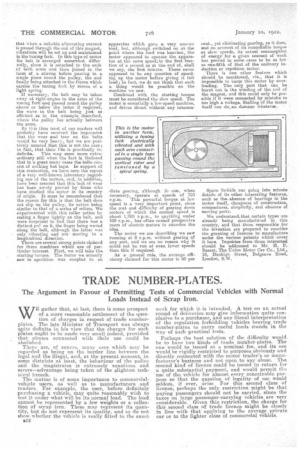TRADE NUMBER-PLATES.
Page 10

If you've noticed an error in this article please click here to report it so we can fix it.
The Argument in Favour of Permitting Tests of Commercial Vehicles with Normal Loads Instead of Scrap Iron.
WE gather that, at last, there is some prospect of a more reasonable settlement of the question of charges in respect of trade numberplates. The late.Minister of Transport was always quite definite in his view that the charges for such plates ought to be made very small indeed, provided that abuses connected with their use could be abolished.
There are, of cour.le, many uses which may be regarded as being on the border line between the legal and the illegal, and, at the present moment, in some districts at least, the behaviour of the police and the magistrates is extremely vexatious and severe—advantage being taken of the slightest technical breach.
The matter is of some importance to commercialvehicle users, an well as to manufacturers and traders. For example, the user, before definitely purchasing a vehicle, may quite reasonably wish to test it under what will be its .uormal load. The load cannot be represented by a few weights or a collection of scrap iron. These may represent its quantity, but do not represent its quality, and so do not show whether the vehicle is really fitted to the exact B12 work for which ie•is intended. A test on an actual round of deliveries may give information quite conclusive to a purchaser, and any literal interpretation of the regulation forbidding vehicles bearing trade number-plates to carry useful loads stands in the way of such practical tests.
Perhaps the best solution of the difficulty would. be to have two kinds of trade number-plates. The one would be issued at a nominal fee, and its use would be rigidly restricted to purposes obviously and directly connected with the motor trader's or manufacturer's business and not open to any abuse. The second kind of licence could be issued in return for a quite substantial payment, and would permit the use of the vehicle for almost every conceivable purpose so that the question of legality of use would seldom, if ever, arise For this second class of licence, perhaps the only restriction might be that paying passengers should not be carried, since the taxes on large passenger-carrying vehicles are very considerable. Given this restriction, the charge for this second class rif trade licence might be closely in line with that applying to the average private car or to the lighter class of commercial vehicle.


































